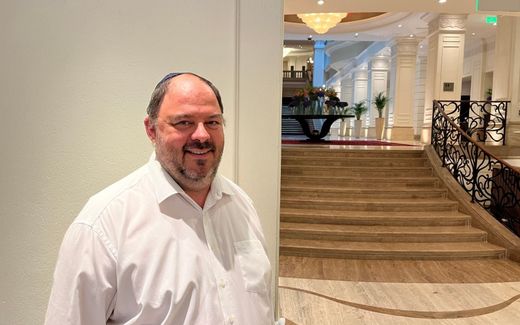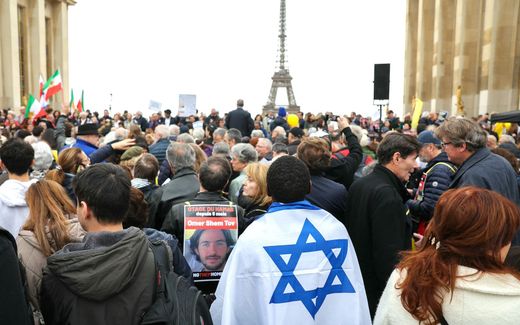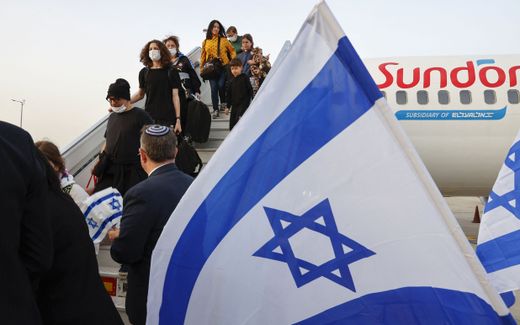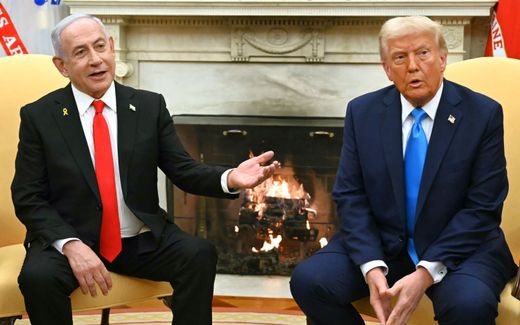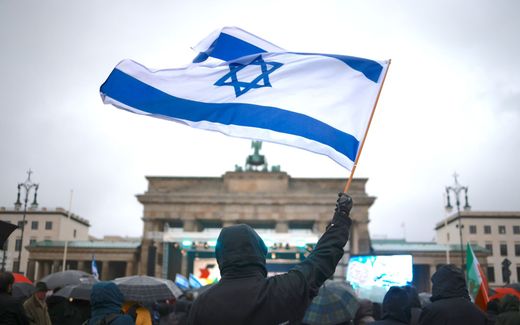European Jews head home to Israel despite challenges
26-04-2025
European Union
Esther Arnusch, CNE.news

Jewish immigrants making aliyah arrive at the Ben Gurion International airport near Tel Aviv, Israel while blowing a shofar and waving the Israeli flag. Photo AFP, Jack Guez
European Union
Israel is entangled in a multi-front war, but Jews do not feel safe in Europe either. Many decide to ‘go home’ and emigrate to Israel.
Stay up to date with Christian news in Europe? Sign up for CNE's newsletter.
From the beginning of the Zionist movement, many individual Christians, like Lord Balfour, who issued the Balfour Declaration, have supported Jewish immigration to Israel. They saw aliyah, Jewish immigration to Israel, as the fulfilment of Biblical prophecy.
Well, immigrating to Israel is one thing; building a new life is another. Immigrants need housing, insurance, a new job, and education for their children. The obstacles are clear: learning a new language, entering a multicultural society, and navigating Israeli bureaucracy.
Raising children with frequent alarms of incoming rockets and terrorist threats never becomes routine. However, despite the challenges, most new immigrants are thankful to be in Israel; there is a sense that they have come home.
Corrie van Maanen knows that each immigration story is unique. She is a Dutch nurse who has cared for new immigrants for almost thirty years. Christophe Levi Alvares, a physiotherapist from France, and Asaf Scimone, an editor from Holland, shed light on their experience of immigration to Israel.
Good care
Most people need help with integration in Israel. "Good care is important", says Corrie van Maanen (63), who volunteers for the International Christian Embassy in Jerusalem (ICEJ). She has done this work since 1996.
Van Maanen herself lives in a humble, cosy flat. The ICEJ supports Jewish people in their 'return' to Israel. According to van Maanen, this work involves seamless collaboration between Jewish and Christian organisations.
She visits the newcomers and meets them at their kitchen table. "What does this person need?" she asks herself.
Every day is different. All immigrants are different. One day, she does groceries for a 99-year-old Holocaust survivor. Another day, she arranged homework support for children from a single mother. Van Maanen may also go to medical appointments or have a chat.
Every Wednesday, she eats soup with a client who got depressed after the October 7 war and just needs some company. A lot of her work is listening and caring. For her elderly clients, Corrie is often the only person they see that week. She loves her work.

Corrie sees the immigration of Jews to Israel as the fulfilment of ancient Biblical prophecies. Deuteronomy 30:3 says: "The LORD your God will bring you back from captivity, and have compassion on you, and gather you again from all the nations where the LORD your God has scattered you."
The prophets Isaiah, Jeremiah, Ezekiel, and Amos also foresaw the time when God would gather the Jewish people from the nations where He had scattered them back to the land of Israel. "To see these prophecies coming to fruition in our own day and age—that is the greatest miracle of our modern history."
Pogroms
Aliyah has gone through waves. The first wave of immigration to Israel took place from 1882-1904, the consequence of pogroms and antisemitic massacres in Russia and Romania. Jewish immigrants made their home in what was then the Ottoman Empire.
These pioneers settled the land and developed the first agriculture in Israel. The land was swampy, and diseases and hardship took their toll; without the help of European philanthropists, these pioneers could not have succeeded.
The Russian aliyah began in 1990. After the collapse of the USSR, the number of Jews emigrating from Russia has gone down from 30,000 a month in 1990 to around 1200 per month in 2024. In 2022, 1.3 million Russian Jews lived in Israel, over 15 per cent of the total population. Most of Van Maanen's clients are from the Russian aliyah; she speaks Russian fluently.

Because of the war, the newcomers from Russia and Ukraine are fewer now. But the numbers from Western Europe—like Great Britain, France, Switzerland, and Holland—are steadily increasing. The total number of immigrants from Western Europe was 3,746 in 2024 compared to 2,227 in 2023, an increase of 68 per cent. From France alone, 2,178 Jews immigrated to Israel in 2024, compared to 1,097 in 2023, an increase of 99 per cent.
Antisemitism in France
Christophe Levi Alvares, 63, is a physiotherapist from Grenoble, the capital of the French Alps. He was surrounded by snow-capped mountains and had friends, family and work. Now, Israel is his home.

Antisemitism is a daily reality for French Jews. Levi Alvares advised his daughter to remove her last name from the letterbox by her door. He gave up his habit of praying in the common prayer room for Jews, Muslims and Christians. "It was too dangerous." Jewish colleagues whispered about Israel – they didn't want to be known as Jews. He learnt to take care.
Messianic Seal
He wears a Messianic Seal of Jerusalem around his neck, combining the Menorah and an Ichthus fish. The Menorah's base and the fish's mouth together form a Star of David. This symbol dates to the early church in the Book of Acts.

For Levi Alvares, it symbolises that his Jewish roots cannot be separated from his Christian faith. He and his wife experienced God's call to move to Israel but had to wait on God's timing. The family originally made aliyah in 2010, but since the state of Israel didn't recognise his physiotherapy diploma, he could not find work.
After a year, the family returned to France. It was painful: "My wife cried every day for six months." Her heart was in Israel. When Alvares realised that the Lord would bring them home in His time, a burden came off his shoulders. In his own words, "The gardener plants the trees, not the trees plant themselves."
He struggled with his Protestant church's inability to understand his desire to move to Israel. "They believed in replacement theology." They did not understand the deeper meaning of his immigration.
Even many of his secular fellow immigrants from France have experienced an inexplicable pull to move to Israel and told him, "We have to go." The Spirit can move people, he says.
They sold everything immediately after his retirement in November 2024 and returned to Israel. After he finishes his Hebrew language course, he hopes to volunteer with injured and traumatised soldiers.
Spirit of the country
Asaf Scimone, 72, first arrived in Israel from the US in the 1970s and served in the IDF, the Israeli army. He moved to the US and Holland for university and work but couldn't help returning to Israel. He loves the "spirit of the country": He loves music and says there is music everywhere. "The atmosphere in Israel is natural, not phoney." He feels at home.
He first arrived as a returning citizen in 2016. Finding work was challenging, he says, as integration programs are geared toward under-35-year-olds. After thirty months, he returned to Holland and continued to work as an editor and translator until his retirement in 2023.
After his retirement, he arrived at Ebenezer Operation Exodus' Haifa House on October 2, 2023, five days before the war broke out. The house provided him with a soft landing in the country. Ebenezer Operation Exodus has offices in 32 countries worldwide and has two absorption houses: Haifa and Ashkelon. Immigrants come with their suitcases, stay for three weeks, and sort out their immediate needs: finding a place to learn the language, finding a job and a flat, and handling Israeli bureaucracy.

The war forced Scimone to stay on longer. Even after he found a place to live at Kibbutz Daphna, right on the border with Lebanon, he came back regularly to get a respite from the constant Hezbollah rocket attacks from Lebanon.
He knew Kibbutz Daphna from when he was young and returned to work in the milking parlour. The strong sense of community and love for life make Israel unique: "There is no other place like it."
Related Articles

